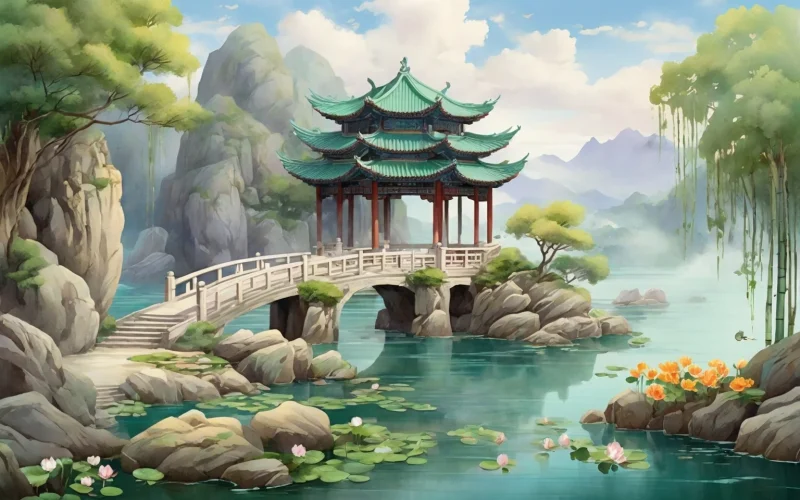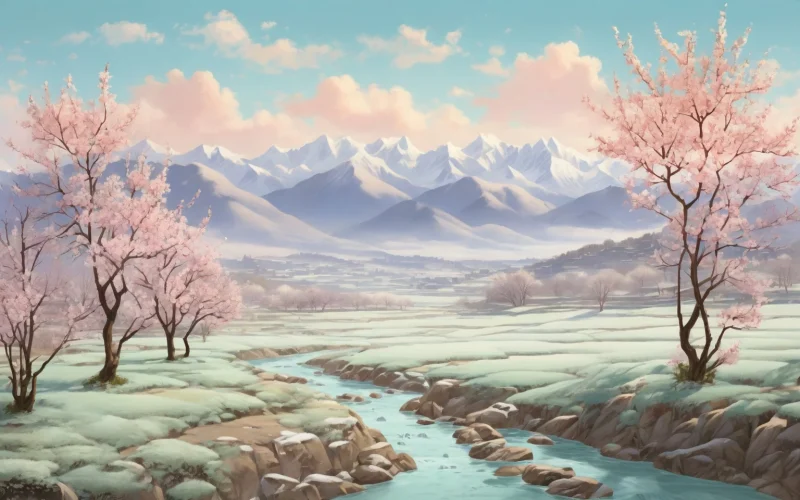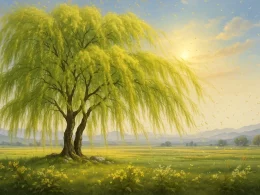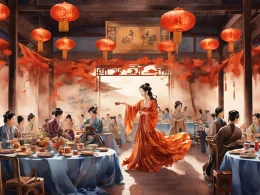The pavilion hovers over liquid geometry,
Its lattice trembles with reflected quantum.
Jade-bamboo spears through the grove's democracy,
Twin rainbows bridge the flat bridge's phantom.
Fish auction beauty for algae-coins below,
Clear water exposes cold sand's cashflow.
Don't ask how lotus curves unfold—
Just follow scent-trails through liquid gold.
Original Poem
「水香亭」
曾巩
临池飞构郁岧巉,櫺槛无风影自摇。
群玉过林抽翠竹,双虹垂岸跨平桥。
烦依美藻鱼争饵,清见寒沙水满桡。
莫问荷花开几曲,但知行处异香飘。
Interpretation
Composed during Zeng Gong's service as a local official, this poem reflects the scholar's deep appreciation for natural landscapes during a visit to the Pavilion of Water Fragrance (水香亭). While Zeng's poetry never prioritizes ornate diction, it excels in capturing profound beauty within tranquil scenes, using nature as both aesthetic object and philosophical medium. This work exemplifies his ability to transform simple observations into meditations on serene living.
First Couplet: "临池飞构郁岧巉,櫺槛无风影自摇。"
Lín chí fēi gòu yù tiáochán, líng jiàn wú fēng yǐng zì yáo.
Overlooking the pond, the soaring structure stands austere; / Window lattices cast rippling shadows though no wind's near.
The pavilion's architectural grandeur ("soaring structure" 飞构) contrasts with its delicate reflections, creating a paradox of solidity and movement that defines the scene's magical realism.
Second Couplet: "群玉过林抽翠竹,双虹垂岸跨平桥。"
Qún yù guò lín chōu cuì zhú, shuāng hóng chuí àn kuà píng qiáo.
Jade-like clusters pierce the grove - emerald bamboo shoots; / Twin rainbows descend to span the flat bridge's roots.
Nature's artistry rivals human craft: bamboo becomes precious jade (群玉), while rainbows architecturally "span" (跨) the bridge. The imagery merges mineral, plant and atmospheric beauty.
Third Couplet: "烦依美藻鱼争饵,清见寒沙水满桡。"
Fán yī měi zǎo yú zhēng ěr, qīng jiàn hán shā shuǐ mǎn ráo.
Fish jostle through lovely weeds, competing for feed; / Clear waters reveal chill sand, nearly flooding the oar's need.
The aquatic close-up shifts perspective downward, where life's hustle ("competing for feed" 争饵) occurs within crystalline transparency ("clear waters reveal chill sand" 清见寒沙), embodying Confucian ideals of visible governance.
Fourth Couplet: "莫问荷花开几曲,但知行处异香飘。"
Mò wèn héhuā kāi jǐ qǔ, dàn zhī xíng chù yì xiāng piāo.
Ask not how many lotus curves unfold; / Just walk - strange fragrances will your path enfold.
The concluding wisdom rejects quantitative analysis ("how many curves" 几曲) for sensory immersion. The "strange fragrances" (异香) become metaphysical guides, suggesting enlightenment through unpremeditated experience.
Holistic Appreciation
This is a lyrical work where scenery conveys emotion, painting a harmonious and beautiful natural space through delicate imagery—pavilions and terraces, shimmering water and bamboo shadows, leaping fish and swaying algae, and the subtle fragrance of drifting lotus. Within this tranquil and serene landscape, the poet expresses his appreciation for beauty beyond the mundane and a self-contented state of mind. Though devoid of direct emotional expressions, the poem exudes a sense of leisure and composure throughout, leaving readers refreshed upon reading.
The scenes unfold layer by layer—from pavilions to forests, from bridges to waters, from distant views to close observations, and finally to the olfactory sensation of fragrance—expanding the poetic realm without losing coherence. The artistic conception is exquisitely crafted.
Artistic Merits
- Clear Layers, Shifting Scenes
The arrangement of scenery in the poem is orderly yet varied, moving from pavilions to woods, bridges to waters, and concluding with lotus fragrance, showcasing superb compositional technique. - Emotion Embedded in Scenery, Depth Within Simplicity
Though emotions are not explicitly stated, the beauty of nature conveys the poet’s admiration for the natural world and the tranquility of his spirit, evoking a sense of ease and leisure. - Fresh Language, Flowing Rhythm
The verses are melodious and rhythmically natural. The diction, though unadorned, carries a refreshing clarity, embodying Zeng Gong’s signature style of "graceful ease."
Insights
This work conveys the wisdom of "seeking not obscurity, yet finding depth within the heart" through natural scenery. Maintaining clarity amid chaos and discovering serenity in beauty is a recurring theme in Zeng Gong’s poetry. It reminds us that life need not be fixated on form and detail; as long as the heart is calm and the eyes perceive beauty, even within the mundane world, one can experience the freedom and detachment of "exotic fragrance drifting."
About the Poet
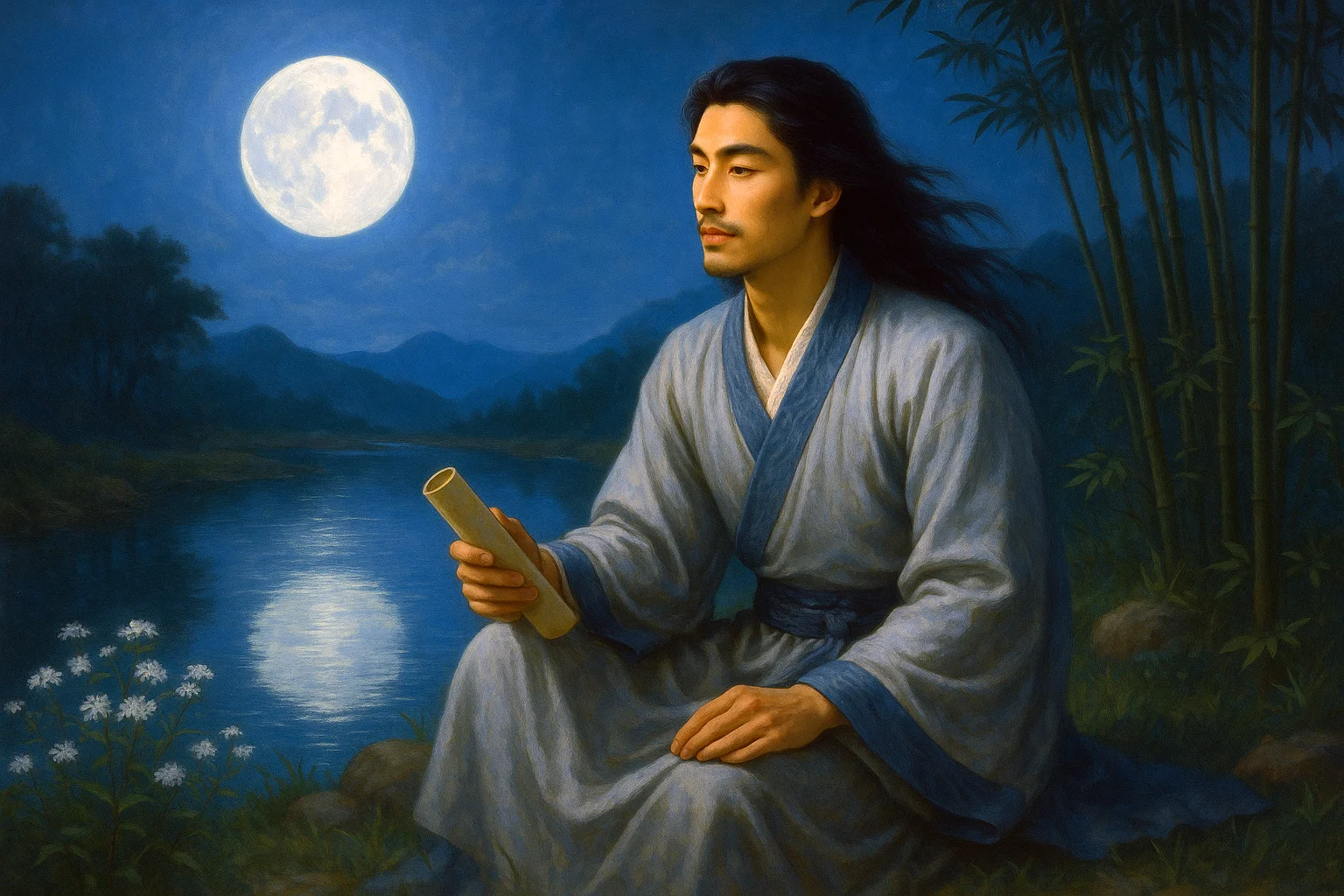
Zeng Gong (曾巩, 1019 - 1083), a native of Nanfeng in Jiangxi province, stands among the illustrious "Eight Great Masters of Tang-Song Prose." His writings distinguished themselves through an elegant classical balance, celebrated for their rigorous argumentation and refined literary craftsmanship. While his poetry embraced an artless subtlety, his prose achieved what critics hailed as "the very essence of purity" - an achievement that, though perhaps less dazzling than his contemporaries like Su Shi or Wang Anshi, earned him posthumous reverence as the founding master of the "Nanfeng Literary School."






